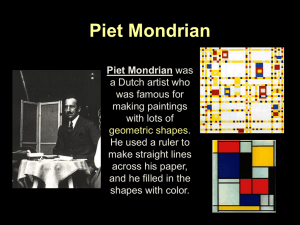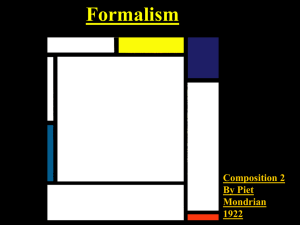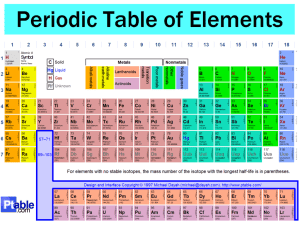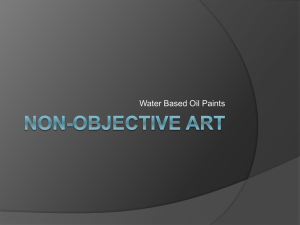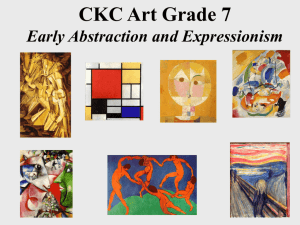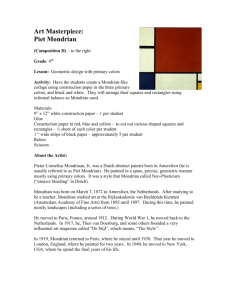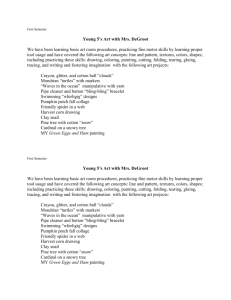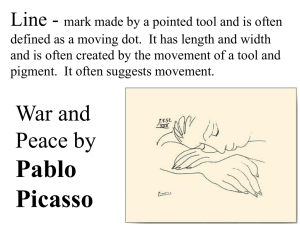Lecture 6 New Movements in Twentieth
advertisement
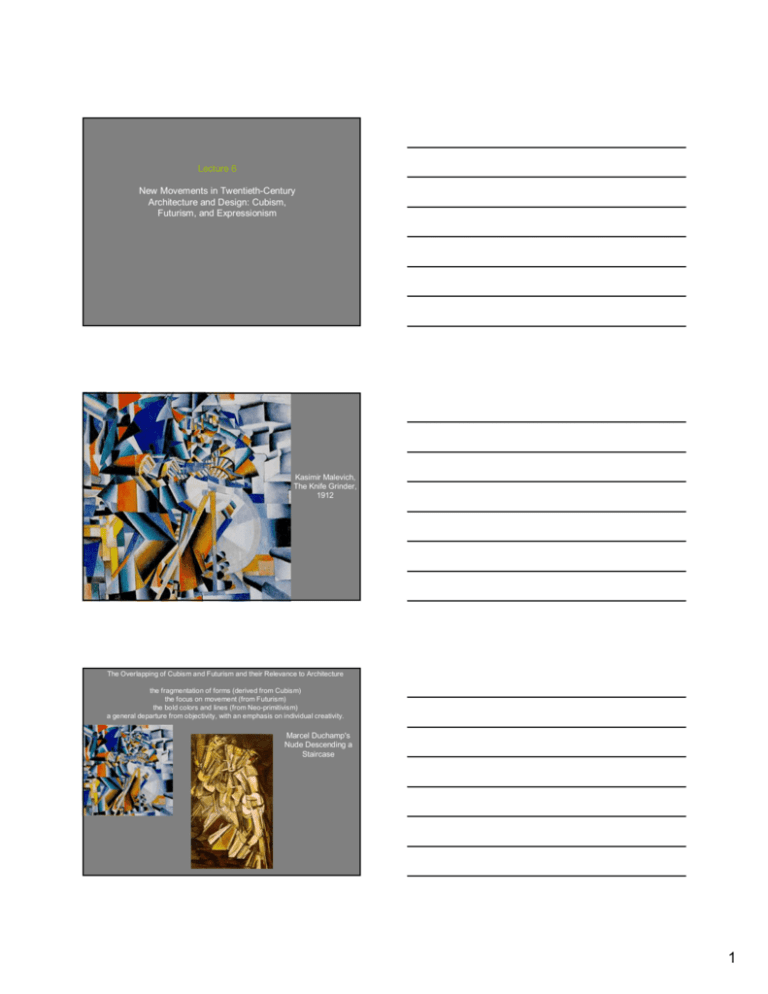
Lecture 6 New Movements in Twentieth-Century Architecture and Design: Cubism, Futurism, and Expressionism Kasimir Malevich, The Knife Grinder, 1912 The Overlapping of Cubism and Futurism and their Relevance to Architecture the fragmentation of forms (derived from Cubism) the focus on movement (from Futurism) the bold colors and lines (from Neo-primitivism) a general departure from objectivity, with an emphasis on individual creativity. Marcel Duchamp's Nude Descending a Staircase 1 Josef Chochol, Prague apartment house, 1913-14 “We declare that the splendor of the world has been enriched by a new beauty-the beauty of, speed. A racing car with its hood draped with exhaust pipes like firebreathing serpents – a roaring racing car, rattling along like a machine gun, is more beautiful than the winged victory of Samothrace.” Filippo Tommaso Marinetti 1876-1944 (seen below in a “Futurist Portrait” 1930) Umberto Boccioni, Unique Form of Continuity in Space, 1913 We go all the way back to the first universal sensation that our spirit can already perceive thanks to the extremely intense synthesis of all the senses in a universal whole which will make us return through and beyond our millennial complexity, to primordial simplicity." "It is achieved through the intuitive search for the one single form which produces continuity in space." Umberto Boccioni’s visual transcriptions of energy help artists think about the representation of movement in a variety of forms and materials 2 Antonio Sant’Elia, Project for a station for airplanes and tranes with funicular lifts connecting to three levels of streets,” Italy, 1914 (Stazione d'aeroplani e treni ferroviari con funicolari e ascensori su tre piani stradali) Antonio Sant’Elia La Citta Nuova (The New City), 1914 Sant’Elia, Project for an Electrical Power Station, 1914 3 Nicola Djulgheroff Lighthouse to mark the victory of the machine, 1927 Piero Portaluppi, Studies for dwellings and offices in "Hellytown" (1926) Giacomo Matté-Trucco, FIAT Lingotto car factory (1916-1926) 4 . . Bruno Taut, “Sun, Glacier, and Glass,” from his book, Alpine Architecture, 1919 5 Bruno Taut, “Crystal Mountain,” Alpine Architecture, 1919 Bruno Taut, Various projects for a “City Crown” (Stadtkrone), 1919-20, a new expressionist iteration of a cultural acropolis Hermann Finsterlin, project for a house of glass, 1920 6 Frank Gehry, Guggenheim Museum, Bilbao, Spain, 1986-1997 Frank Gehry, Mixed-use Office and Residential Building, Prague, 1996 (the “Fred and Ginger” Building) Bruno Taut, Pavilion for the Glass Industry “Luxfer” Syndicate, 1914, Cologne Werkbund Exposition 7 Bruno Taut, Pavilion for the Glass Industry “Luxfer” Syndicate, 1914, Cologne Werkbund Exposition, longitudinal section Ludwig Mies van der Rohe, Project for a Glass High Rise, 1922, Berlin Friedrichstrasse. Ludwig Mies van der Rohe, Project for a Glass High Rise, 1922, Berlin Friedrichstrasse, view of model as reconstructed by MoMA. 8 Ludwig Mies van der Rohe, Project for a Glass High Rise, 1922, Berlin Friedrichstrasse, view of alternative design Erich Mendelsohn (1887-1953), the adaptable curves, glass, and dynamism of form in projects such as the Einstein Tower Observatory, Potsdam, Germany, 1921 Mendelsohn, Schocken Department Store, Stuttgart, 1926 9 Rudolf Petersdorff Department Store, Breslau, 1927/28 Night view of another Schocken Department Store by Mendelson – note the effects of his ‘Lichtarchitektur’ (light architecture) and the purposely achieved transparency of the floor-to-ceiling shop windows on the ground floor Piet Mondrian, Dutch Modernist painter, 1872-1944 An important contributor to 20th-century abstract painting and the Dutch De Stijl movement. His journey from realism to Impressionism to abstraction represents a major moment in the evolution of 20th-century artistic expression in painting. Contemporary Photograph, “Live Oak” – very similar to Mondrian’s early hyper-realist graphite sketches of trees and views of the forest executed in the 1890s Piet Mondrian, Red Trees, 1908 10 Piet Mondrian (Dutch), Study of Trees, 1913 Piet Mondrian, The Red Tree, 1910 Piet Mondrian, The Red Tree, 1910, detail 11 Piet Mondrian, The Grey Tree, 1911 Piet Mondrian, Trees, 1912 Piet Mondrian, Flowering Tree, 1912 12 Piet Mondrian, Line and Color, 1915 Piet Mondrian, Composition, 1915 Piet Mondrian, Composition, 1915 13 Piet Mondrian, Composition, 1921 Piet Mondrian, Broadway Boogie Woogie, 1943 Theo van Doesburg, Project for the “Cinema Dance Hall,” perspective view, Strasbourg, France, 1928 14 Theo van Doesburg, Cinema Dance Hall, Strasbourg, France, 1928 Gerritt Rietveld, Schroeder House, Utrecht, 1924 Gerritt Rietveld, Schroeder House, Utrecht (Holland), 1924, exterior view 15 Gerritt Rietveld, Schroeder House, Utrecht, 1924, ground floor plan Gerritt Rietveld, Schroeder House, Utrecht, 1924, second floor plan (note retractable partitions) Gerritt Rietveld, Schroeder House, Utrecht, 1924, interior view 16 Gerritt Rietveld, table and chair, 1924 Gerritt Rietveld, Schroeder House, Utrecht, 1924, interior perspective view 17
